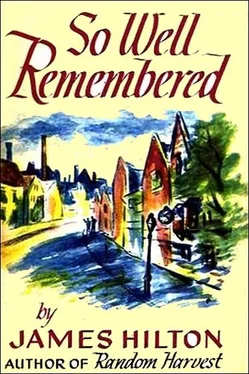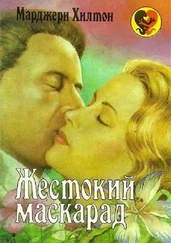Джеймс Хилтон - So Well Remembered
Здесь есть возможность читать онлайн «Джеймс Хилтон - So Well Remembered» весь текст электронной книги совершенно бесплатно (целиком полную версию без сокращений). В некоторых случаях можно слушать аудио, скачать через торрент в формате fb2 и присутствует краткое содержание. Год выпуска: 1945, Жанр: Проза, на английском языке. Описание произведения, (предисловие) а так же отзывы посетителей доступны на портале библиотеки ЛибКат.
- Название:So Well Remembered
- Автор:
- Жанр:
- Год:1945
- ISBN:нет данных
- Рейтинг книги:5 / 5. Голосов: 1
-
Избранное:Добавить в избранное
- Отзывы:
-
Ваша оценка:
- 100
- 1
- 2
- 3
- 4
- 5
So Well Remembered: краткое содержание, описание и аннотация
Предлагаем к чтению аннотацию, описание, краткое содержание или предисловие (зависит от того, что написал сам автор книги «So Well Remembered»). Если вы не нашли необходимую информацию о книге — напишите в комментариях, мы постараемся отыскать её.
So Well Remembered — читать онлайн бесплатно полную книгу (весь текст) целиком
Ниже представлен текст книги, разбитый по страницам. Система сохранения места последней прочитанной страницы, позволяет с удобством читать онлайн бесплатно книгу «So Well Remembered», без необходимости каждый раз заново искать на чём Вы остановились. Поставьте закладку, и сможете в любой момент перейти на страницу, на которой закончили чтение.
Интервал:
Закладка:
George took his ‘no’ for an answer exactly as he had begun to do on the Council whenever he brought up his housing scheme—that is to say, he seemed to accept it good-humouredly and as final while all the time he was planning how he could best bring the matter up again. Besides which, in this case, he was in love. He had supposed he had been in love before, on several occasions, but the difference in what he felt for Livia convinced him that THIS was love—because why else should he begin to neglect his Council work—not much, not even in a way that could be noticed by anyone else, but enough to give him qualms of conscience only to be stifled by reflecting that as soon as he had won her he would make up for lost time? He gave himself the same consolation over similar neglect of his examination studies. After all, even in battles, the first must come first. He had confidence that he would win her eventually, not only because he had confidence about most things in those days, but because—as he saw it —there was no considerable rival in the field—only Stoneclough, and he felt himself more than a match for bricks and mortar, however darkly consecrated. How could she long hesitate between the past and the future, especially as there were moments when he felt so sure of her —physical moments when she seemed to withdraw into a world of her own sensations that offered neither criticism nor restraint, in contrast to her usual behaviour, which was to make of most contacts a struggle for mastery? He was a clumsy lover, and ruefully aware of it; as he said once, when she emerged from her private world to laugh at him: “Aye, I’m a bit better on committees…”
The fact that she would never say, in words, that she loved him mattered less after she had said, both doubtfully and hopefully, in reply to his fifth or sixth proposal: “I MIGHT marry you, George, some day. If I ever marry anyone at all…”
He never passed beyond the gates of Stoneclough; she never invited him, and he never suggested it. She told him little about herself, and the promise he had given not to mention her father set limits to his personal questions about other matters, though not to his curiosity. He wondered, for instance, why old Richard Felsby, her father’s former partner, had not helped her financially, for Richard had dissolved partnership and sold out his interest in the firm before the crash, so that he was still rich and could well have afforded some gesture of generosity. But when once George spoke Richard Felsby’s name he knew he had in some way trespassed on forbidden territory. “I don’t see him,” was all she said, “and I don’t want to. I NEVER want to see him.”
She said little, either, about her life at Stoneclough, except to reiterate, whenever he brought up the matter, that she would rather live there than anywhere else, despite the inconvenience of the three-mile walk. He gathered that there was some old woman, a kind of housekeeper, living there also, and that the two of them shared cooking and other domestic jobs; but she gave him few details and he did not care to probe. Most of his time with her was spent along the Stoneclough road, walking evening after evening during that long fine summer; but as the days shortened and the bad weather came, they sometimes met in the Library at midday, when she had an hour off and they could talk in one of the book-lined alcoves of the Reference Department. They spoke then in whispers, because of the ‘Silence’ notice on the wall; and there was piquancy in that, because as Chairman of the Public Library Sub-Committee he had a sort of responsibility for seeing that Library rules were enforced.
One lunch hour she greeted him in such a distraught way that he knew immediately something was wrong. Soon she told him, and even in face of her distress his heart leapt with every word of the revelation. By the time she had finished he knew that fate had played into his hands, so he proposed again, with all his quiet triumph hidden behind a veil of sympathy. For George could not avoid a technique of persuasion that made his last thrust in battle—the winning one—always the kindest. And by sheer coincidence, in that odd way in which at important moments of life the eye is apt to be caught by incongruous things, he noticed while he was talking that just above her hair, and glinting in the same shaft of sunshine, lay an imposing edition of Creasy’s Fifteen Decisive Battles of the World. He couldn’t help smiling and thinking it a good omen.
The news that had so distressed her was that the bank had foreclosed the mortgages on Stoneclough, so that she would have had to leave the house in any event. George tried to feel that this did not detract from his triumph, but merely contributed to it. He assured her that she would find it more fun living in a small house than in a great barracks of a place like Stoneclough. “I’d like to know what the bank thinks it can do with it…”
She made no comment, but asked after a pause: “Do you like dogs?”
“Aye, I like ‘em all right. Used to have one when I lived with my Uncle Joe—a big black retriever.”
“My dog’s small—and white. His name’s Becky.”
He suddenly realized what she was driving at. “You mean you want to bring your dog to live with us? Why, of course… And I like any dog, for that matter.”
They were married a few weeks later at Browdley Register Office, with only a few friends of George’s in attendance. She was nineteen, and the fact that he was getting on for twice that age was only one of the reasons why the affair caused a local sensation.
Councillor Whaley, a seventy-year-old confirmed bachelor and one of those political opponents whom George had converted into a staunch personal friend, took him aside after the ceremony to say: “Well, George, she’s smart enough, and ye’ve got her, so God bless ye both… I doubt if it’ll help ye, though, when ye come up for re-election.”
“And d’you think that worries me?” George retorted, with jovial indignation. “Would you have me marry for votes?”
Tom Whaley chuckled. “I’ll ask ye ten years hence if ye’d vote for marriage—that’s the real question.” George then laughed back as he clapped the old man on the shoulder and reflected privately that Tom Whaley mightn’t be alive ten years hence, and how lucky he himself was, by contrast, to have so much time ahead, and to have it all with Livia. For he was still young enough to think of what he wanted to do as a life-work, the more so as the world looked as if it would give him a chance to do it.
George, ever ready to be optimistic, was particularly so on that day of his marriage.
So were millions of others all over the earth—for it was the month of November, 1918.
The honeymoon, at Bournemouth, was a happy one, and by the time it was over George knew a great many things—a few of them disconcerting —about Livia, but one thing about himself that seemed to matter and was simple enough, after all: he loved her. He loved her more, even, than he had thought he would, or could, love any woman. When he woke in the mornings and saw her still sleeping at his side he had a feeling of tenderness that partly disappeared as soon as she wakened, but somehow left a fragrance that lasted through the day, making him tolerant where he might have been unyielding, amused where he might have been antagonized. For she was, he soon discovered, a person with a very definite will of her own. He thought she was in some ways more like an animal than any human being he had ever met; but she was like a REAL animal, he qualified, not just a human animal. There was intense physicality about her, but it was unaware of itself and never gross; on the other hand, she had a quality of fastidiousness that human beings rarely have, but animals often. He could only modestly wonder how he had ever been so confident of winning her, because now that he had done so she seemed to him so much more desirable that it was almost as if he had to keep on winning, or else, in some incomprehensible way, to risk losing. And when he returned to Browdley that was still the case. He had hoped, after marriage, to concentrate more than ever on his Council work and on study for the university examination—to make up for such splendidly lost time with a vengeance; yet to his slight dismay there came no relief at all from a nagging preoccupation that he could not grapple with, much less analyse. He found it actually harder to concentrate on the Cambridge Modern History, harder to generate that mixture of indignation and practical energy that had just barely begun to move the mountains of opposition to everything he wanted to do as town councillor. It was as if the fire with which she consumed him were now seeking to consume other fires.
Читать дальшеИнтервал:
Закладка:
Похожие книги на «So Well Remembered»
Представляем Вашему вниманию похожие книги на «So Well Remembered» списком для выбора. Мы отобрали схожую по названию и смыслу литературу в надежде предоставить читателям больше вариантов отыскать новые, интересные, ещё непрочитанные произведения.
Обсуждение, отзывы о книге «So Well Remembered» и просто собственные мнения читателей. Оставьте ваши комментарии, напишите, что Вы думаете о произведении, его смысле или главных героях. Укажите что конкретно понравилось, а что нет, и почему Вы так считаете.










